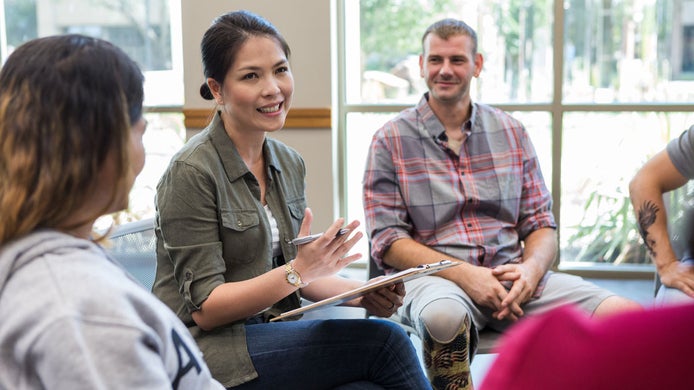Explore our resources for psychology and counseling degrees and learn about career options that fit your future.

This blog was written by UMass Global Psychology Faculty; Dr. Sara Lee (PsyD, LMFT, UMassGlobal Assistant Clinical Director, UMassGlobal Assistant Professor of Psychology), Dr. Melani Kovarkizi-Natneil (PsyD, LMFT, UMass Global Assistant Clinical Director, UMassGlobal Assistant Professor of Psychology), and Dr. Isa Ribadu (PhD, LMFT, UMass Global Associate Dean of the School of Arts and Sciences, Professor of Psychology).
Are you passionate about helping others navigate life’s challenges, heal from past wounds, and help build healthier relationships? If so, pursuing a career as a Marriage and Family Therapist (MFT) or a Professional Clinical Counselor (PCC) might be your calling.
Choosing the right program is a big decision, so here are some insights to help you feel confident about taking that next step
What is the Difference Between an MFT and an PCC Degree?
Both the Master of Arts in Marriage and Family Therapy (MFT) and the Master of Arts in Professional Clinical Counseling (PCC) programs prepare students to make a real impact in the lives of others.
The MFT program focuses on helping individuals, couples, and families navigate relationship challenges, communication issues, and life transitions. Students learn to apply systems thinking to nuanced clinical cases, including but not limited to addressing crisis management, anxiety, depression, personality challenges, and trauma. To learn more about Marriage and Family Therapy, please refer to the AAMFT video on MFT.
The PCC program equips students to work with individuals of all ages facing mental health concerns such as anxiety, depression, grief, and career challenges — helping them to manage thoughts, emotions, and outcomes in a positive way. Training within this program emphasizes evidence-based counseling approaches, career counseling, and individualized care. For more information about becoming a Professional Clinical Counselor, refer to the description shared by the American Counseling Association.
Both programs integrate academic knowledge with a compassionate approach, preparing graduates to support individuals with respect, empathy, and professional skill. While clients may present similar challenges, the way each profession approaches healing is different. Professional counselors focus on the individual’s inner world, emotions, thoughts, and behavior, while marriage and family therapists use a systemic, holistic lens that considers the individual within their broader relational and social contexts. Both paths may offer the opportunity for licensure in your state, allowing you to provide meaningful care and support for mental and emotional well-being.
Inside the Experience: Getting a MFT or PCC Degree
“One of the most rewarding parts of this journey is seeing the transformation not only in your clients but also in yourself.”
-Dr. Melani Kovarkizi-Natneil
Becoming an MFT or a PCC isn’t just about learning techniques or theories; it is also about experiencing your own growth and working with your clients with compassion, empathy, and resilience.
Here’s what you can expect as you train to become a clinician:
- Self-Discovery: You’ll grow personally as you explore your own beliefs, biases, and experiences. This self-awareness is essential for supporting others effectively.
- Hands-On Learning: You’ll work directly with clients under the guidance of a licensed supervisor.
- Diverse Skill Building: You’ll learn to manage a clinical room and facilitate the process of change. In addition, you will learn basic skills such as empathetic listening, Socratic questioning while utilizing evidence-based practices, and systemic approaches to therapy.
MFT and PCC Career Opportunities
Graduating from an MFT or PCC program opens the door to a wide variety of career paths. Many graduates go on to work in:
- Private practice or group practices
- Community mental health centers
- Government agencies
- Hospitals or healthcare organizations
- Schools and universities
- Nonprofits and faith-based organizations
- Residential treatment facilities
- Corporate wellness or employee assistance programs (EAPs)
As mental health awareness continues to grow, so does the demand for qualified therapists and counselors.
Why UMass Global?
If you are passionate about helping others and want to make a lasting impact in mental health, University of Massachusetts Global’s Master of Arts in Marriage and Family Therapy (MFT) and Professional Clinical Counseling (PCC) programs are designed for you.
Here’s what makes UMass Global stand out:
- Faculty who practice what they teach – Instructor are active clinicians, bringing real-world insights into every lesson.
- Live, interactive learning – Most classes are taught synchronously via Zoom, giving you real-time access to faculty and classmates.
- Dedicated clinical support – You’ll be guided by a clinical team made up entirely of AAMFT-approved supervisors.
- Diverse perspectives – Faculty represent a wide range of cultural and professional backgrounds, enriching the classroom experience.
- Career readiness – Gain the tools, mentorship, and confidence to step into the field as a skilled mental health professional.
Take the first step toward a rewarding career where you can truly change lives.
Is an MFT or PCC Path Right for You?
Here are a few questions to consider as you reflect on your decision:
- Do you feel called to help others through challenges, trauma, or relational struggles?
- Are you willing to invest in your own growth and healing as part of the process?
- Can you commit to the time and effort required for both academic study and clinical training?
- Does the idea of making a lifelong impact excite and motivate you?
If you answered “yes” to most of these, an MFT or PCC program may be a perfect fit.
If you find yourself drawn to one of these career paths, UMass Global offers a degree program for each concentration or a dual-emphasis program highlighting both fields of study:
- MA in Professional Clinical Counseling
- MA in Marriage & Family Therapy and Professional Clinical Counseling
Ready to take the next step? Request more information and speak with an enrollment coach at (800) 746-0082 or apply today!





